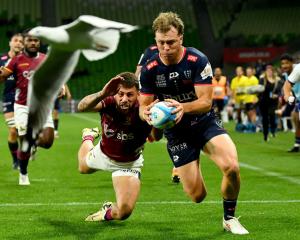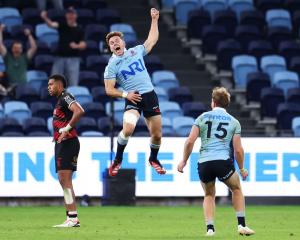ODT Online rugby writer Jeff Cheshire looks at what we learned from the Highlanders' loss to the Crusaders at the weekend.
It's a different game against the big boys
The past two weeks might suggest the Highlanders' form has dipped substantially - with two big losses in the two rounds before the playoffs. But maybe it just shows the state of things and is an indicator of where this team is at. They have shown themselves capable of competing with most teams during 2014.
Over the past two weeks they have come up against the two form sides of the competition on their home patches. This has shown just how much of a step up it is playing against these teams and how good you have to be to beat them. Not only will they wear you down and rack up plenty of their own points, they will also stop you from playing your own game. The Highlanders have struggled to get any attack going in these games and their threats have been stifled by good line speed from the opposition defences and big, physical forward packs.
Perhaps it was a bridge too far to have to play these two in consecutive weeks on the road. The Crusaders were just a better team. It was not that the Highlanders were not trying, they were just worn down and succumbed to immense pressure. Whether the Sharks are quite at this level will be seen in next week's playoff game, but it at least gives the Highlanders a pointer to where they need to be to win a championship.
The importance of Ben Smith
In rugby it is dangerous to rely too much on one player. For the most part the Highlanders have shown the ability to provide cover this year, with replacements stepping up for any injuries. The main exception to this rule came in Ben Smith's absence in this game. His importance became so much clearer, the influence he has in drawing defenders and sparking a movement coming into the line.
Trent Renata was solid filling in for Smith. He did not do a whole lot wrong, but he does not have the pace, strength or vision of Smith - few do. Without Smith there was just no-one who really looked like threatening on attack other than Malakai Fekitoa, on whom the defence were able to focus more attention. Neither winger was able to find the space they normally would and that was probably a similar flow-on from Smith not being there. Along with this, the Crusaders were able to kick long with the knowledge that they did not have the best counter-attacking player in world rugby running the ball back at them. This enabled them to be more flexible in how they played the game and could more confidently send the ball long if need be.
Too predictable
Without Smith adding a spark, the attack was too predictable. The flat ball to the forward runner was too easily defended and the Crusaders forwards were easily matching up, getting off the line fast and tackling aggressively. No-one was really creating any momentum with this and the backs were having to work with static ball against a defensive line that was well-organised and up fast. Give the Crusaders plenty of credit here, but it was clear the Highlanders were struggling to know where to go to make a break, other than the obvious option of Fekitoa.
Set-piece struggles
The set-piece has been good in recent weeks, but struggled against probably the best forward pack in the competition. It was from these that the Crusaders were able to apply so much pressure, both through gaining good ball, earning penalties and mounting drives.
The lineout was an issue, particularly in the first half. The Highlanders were a lot more adventurous with their throws and calls, using a lot of movement and often looking to throw to the back. You can understand the logic behind this, as the Crusaders boast two of the best front-middle contesting lineout jumpers in the competition with Kieran Read and Sam Whitelock. It was always going to be a tough task and they essentially had the option of trying to beat them to the ball or to throw it away from them.
They chose the latter, which made for a pretty tough night for all involved.
At scrum time we saw the quality of Owen Franks, as he had Kane Hames under immense pressure all night. Hames has looked good in the past two games in this area and it probably speaks more for the strength of Franks and the pack behind him than the ineptitude of Hames. Through this dominance they were able to win two penalties in a first half where they were coming thick and fast.
It also meant that the Highlanders found themselves under pressure at the back of the scrum on their own ball, which made it hard to get things going, when things were already tough to get going.
Rolling maul
Three of the Crusaders' four tries came from lineout drives, which says a couple of things. The first is that the defence was for the most part very good, as only once was it truly breached. However, the pressure the Highlanders were under was forcing them to concede penalties, which meant the Crusaders were able to position themselves to execute their maul.
Having a strong set-piece is vital here and it was clear the Crusaders were just that much better. They were able to set a good, solid platform that was not going to split, which is more or less impossible to stop when done right. For years we have seen South African teams use it so effectively, perhaps is a good thing New Zealanders are learning to do it well. Unfortunately, knowing how to do it does not necessarily make it any easier to defend, making it such a potent attacking weapon.













